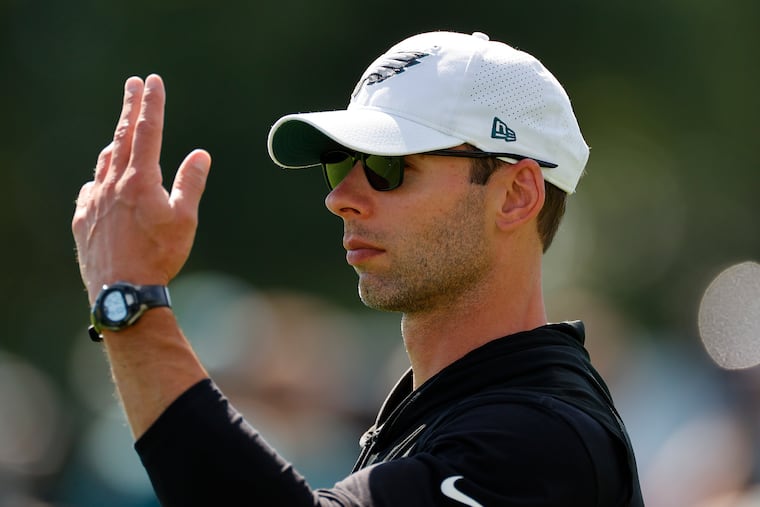Jonathan Gannon seems like a smart guy. The Eagles need him to prove he actually is one.
The question that Gannon still has to answer, after his defense's poor performance against the Lions, is basic: What matters more to him, his scheme or the skills of his players?

When Jonathan Gannon is in a press-conference setting, it’s easy to see why three NFL teams interviewed him last winter for their head coaching jobs. When Jonathan Gannon is in a press-conference setting, he is as smooth and self-assured as a corporate raider addressing a company’s stockholders, funny and smart and authoritative and in control. When Jonathan Gannon is in a press-conference setting, it’s natural to perceive him as a beautiful defensive mind, deploying his players in a manner that maximizes their particular skills and talents, all that intelligence and athleticism melding into a unit that is among the league’s best.
Then Sunday comes around. And over Gannon’s 19 games as the Eagles’ defensive coordinator, unless the Eagles are facing a bottom-of-the-barrel quarterback, the reality of what happens on the field rarely aligns with that perception. In nine of those 19 games, Gannon’s defense has given up 27 points or more. And its performance in the Eagles’ 38-35 victory Sunday over the Lions was poor enough that, before anyone asked him anything Tuesday at the NovaCare Complex, Gannon offered a preemptive My bad! that seemed designed to blunt the force of the questions.
“That is not the standard that we need,” he said. “We need to improve quick, and we will.”
The We that Gannon used there was the key word, because he wasn’t just referring to the Eagles’ defensive players. If it has been an open secret around the Eagles that Howie Roseman has a hand in helping Gannon and Nick Sirianni with their game plans, it isn’t anymore. Gannon confirmed it.
“We say, ‘Hey, we want to come out of the game kind of looking like this,’ and we do that with the head coach and with Howie,” Gannon said. “But then there is always room for, as you go through the game, how the game goes. You don’t know how it’s going to unfold.”
That strategy-by-committee approach isn’t new for the Eagles. It’s how they’ve done things for a long time, and it has its benefits. One is that, when something goes awry, when there’s an undesirable outcome, it’s easier to deflect and diffuse the blame. We had the right scheme and call. We just didn’t make plays. And sometimes that’s true. The Eagles’ tackling Sunday, as one example, left a lot to be desired.
But the drawback to such an approach is that it raises an important question, one that Gannon and the Eagles didn’t answer last season and, based on Sunday’s game, don’t appear to have answered yet this season. When push comes to shove, what matters more to Gannon: his system or the players within it?
Here’s what I mean: The biggest mystery coming out of Sunday was obvious: Why did Jordan Davis, the team’s first-round pick this year, play just 22 snaps, especially since the Lions averaged just 2.9 yards per rush when he was on the field, especially since Davis had looked so strong, and at times dominant, during training camp and the preseason?
» READ MORE: Eagles stats: Missed tackles, Jordan Davis’ snap count
Sirianni on Monday had dismissed the notion that Davis’ presence and play caused the Lions to struggle to run the ball when he was in the game, and it’s possible that Davis wasn’t in good enough shape to play more, that 22 snaps was all he could take, though Gannon did say Tuesday, “Our conditioning level was where it needed to be going into that game.” More, Gannon suggested that the arc of the game forced him, and the Eagles’ depth allowed him, to rotate the defensive linemen.
“You don’t know that you’re going to be up however many points in the third quarter or whatever, and you don’t know how many points you’re going to be down,” he said. “We try to keep that within reason. We set up a game plan and have a game plan for that, but then that can adjust moving forward. That’s why you guys will see all those guys’ snaps. Whoever plays for us, we feel good about.”
OK, but on any team, in any position group, there are guys a coach should feel better about than he does others. Sure, in a world in which all the Eagles’ linemen were interchangeable and of comparable ability, Gannon could adjust his strategy and substitution patterns to the flow of the game and the opponent’s approach. But at some point, the quality and qualities of your players matter, and those factors have to override, say, a coach’s allegiance to his scheme or the salary of a highly paid but aging veteran.
» READ MORE: Eagles Super Bowl odds among latest futures to drop after Week 1
Rotating linemen, for instance, is a convenient way to make sure Fletcher Cox, who signed a one-year, $14 million contract in April, stays on the field, whether his performance warrants those snaps or not. It’s also a way for a coach to look smart, by opting for the complex when the simple will do. If Jordan Davis is helping stop the run, and the Lions are still running the ball, what should the Eagles do? If Haason Reddick is a terrific pass rusher, does it make sense to have him drop back into coverage at all?
It doesn’t take a defensive mastermind to answer those questions. In five days, when the Eagles play the Minnesota Vikings on Monday night, Jonathan Gannon gets his next chance to prove that he actually can.
Inquirer Eagles beat reporters EJ Smith and Josh Tolentino preview the team’s Week 2 game against the Minnesota Vikings. Watch at Inquirer.com/EaglesGameday